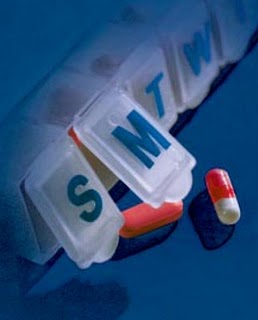Vol. 9, No. 7: SEPTEMBER 2010 – EXECUTIVE SUMMARY
Welcome to the SEPTEMBER 2010 issue of Pharma Marketing News. This is the Executive Summary version. See Article Summaries below.
Thank you for being a reader of Pharma Marketing News. To improve this service, I urge you to take the online Reader Feedback Survey and tell me your thoughts. I have already gotten some great ideas from readers!
Subscribe Now and get the current and future issues delivered FREE by e-mail every month!Also get DISCOUNTS ON SPECIAL SUPPLEMENTS!
Sincerely.
John Mack, Publisher & Editor
Pharma Marketing News
editor@news.pharma-mkting.com
CONTENTS
- Up Front: Solving the Adherence Problem in Economic Hard Times
- Pharma, Physicians, and Sermo
- Eyes on the Adherence Prize
- Closed-Loop Patient Education
- Are Secret Drug Recalls Common?
- Online Behavioral Tracking Becomes More Sophisticated, Annoying — Soon Illegal?
- LillyPad Launches Specious Rocket Attack Against Drug Price Control Straw Man
Article Summaries Up Front
Solving the Adherence Problem in Economic Hard Times
 Medication non-adherence — ie, patients not taking their medications as prescribed by their doctors — is one of the most significant problems in healthcare. It is an even bigger problem during economic hard times as more people cut back their medications to save money. There are many facets to this problem, which cannot simply be solved by lowering drug costs.
Medication non-adherence — ie, patients not taking their medications as prescribed by their doctors — is one of the most significant problems in healthcare. It is an even bigger problem during economic hard times as more people cut back their medications to save money. There are many facets to this problem, which cannot simply be solved by lowering drug costs.
This month’s Pharma Marketing News includes several articles that feature innovative solutions to the adherence problem. In preparation for these articles, several experts will be guests on the Pharma Marketing BlogTalkRadio Show during the month of September.
Read on…this article is AVAILABLE NOW here:
www.news.pharma-mkting.com/PMNews_97_UpFront.pdf
Pharma, Physicians, and Sermo
A Social Media Win-Win-Win!
 In 2007, Pfizer Inc and Sermo, the largest online physician community in the U.S., embarked on a strategic collaboration designed to redefine the way physicians in the U.S. and the healthcare industry work together to improve patient care. Since then, other pharmaceutical companies have also engaged physicians via Sermo
In 2007, Pfizer Inc and Sermo, the largest online physician community in the U.S., embarked on a strategic collaboration designed to redefine the way physicians in the U.S. and the healthcare industry work together to improve patient care. Since then, other pharmaceutical companies have also engaged physicians via Sermo
This article provides an overview of Sermo’s new Client Center and summarizes a Pharma Marketing Talk podcast interview of with Daniel Palestrant, Sermo’s Founder and Chief Executive Officer.
Topics include:
- The Sermo Engagement Model
- New Client Center
- About MDs on Sermo
- Sermo Panels
- Sermo Posts
- Non-Personal Communications Can Overcome Access Issues
- “Green Pasture” Key Opinion Leaders (KOLs) and “Joe Six Pack” Physicians
- Peer-to-Peer Education
- Maintaining Trust Within the Online Community
Demographically, Online Physicians are Similar to Offline Physicians
Order and pay for this reprint now using your credit card…
ONLY $4.95Download PDF file immediately after paying:
Eyes on the Adherence Prize
How HealthPrize Uses Financial Incentives and Fun to Change Patient Behavior
 Medication non-adherence is one of the most significant problems in healthcare. It is responsible for an astonishing number of poor outcomes and, as a result, an estimated $290 billion in otherwise avoidable medical spending in the US per year. It is also responsible for over $150 billion in lost pharmaceutical revenues per year. Up to 25% of prescriptions are never filled, and average medication compliance, for people who do fill their prescriptions, is only about 50% for most chronic diseases.
Medication non-adherence is one of the most significant problems in healthcare. It is responsible for an astonishing number of poor outcomes and, as a result, an estimated $290 billion in otherwise avoidable medical spending in the US per year. It is also responsible for over $150 billion in lost pharmaceutical revenues per year. Up to 25% of prescriptions are never filled, and average medication compliance, for people who do fill their prescriptions, is only about 50% for most chronic diseases.
There have been many strategies to overcome poor adherence. Drug companies, for example, have incentive programs that include coupons for the partial or total re-imbursement of copayments. Usually, however, these programs are designed more for capturing initial market share during the launch phase of a new drug than for maintaining allegiance to a product that has been on the market for some time. With fewer and fewer prospects for new blockbusters, pharmaceutical companies these days can no longer ignore the value of increasing adherence.
Recently, HealthPrize, a startup internet-based software company, was featured in a New York Times article that described a lottery in which patients prescribed warfarin, an anti-blood-clot medication, can win $10 or $100 each day they take the drug.
This article provides details about the HealthPrize’s innovative, compelling approach to solving one of pharma’s most perplexing puzzle: how to improve medication adherence. Included is a summary of a Pharma Marketing Talk podcast interview of Tom Kottler, CEO, and Katrina S. Firlik, M.D., Chief Medical Officer, HealthPrize.
Topic headings include:
- Wasted Money, Poorer Outcomes
- Unique Motivation
- Engagement Engine
- HealthPrize Dashboard (figure)
- A Health Loyalty Program
- Confirming Compliance
- Regulatory, Legal and Ethical Issues
- Which Patients Need Help Most?
- Validation of Content
- The Role of Social Media
Hook Them, Then Build Motivation
Order and pay for this reprint now using your credit card…
ONLY $4.95Download PDF file immediately after paying:
Closed-Loop Patient Education
MedTera and HealthPrize Team Up to Improve Medication Adherence & Health Outcomes
 Research shows that 29 to 71 percent of patients new to therapies (“rookies”) stop taking their prescribed medication during the first month of treatment. This is a discontinuation rate 6 to 31 times greater than during subsequent monthly periods.
Research shows that 29 to 71 percent of patients new to therapies (“rookies”) stop taking their prescribed medication during the first month of treatment. This is a discontinuation rate 6 to 31 times greater than during subsequent monthly periods.
To address this problem, MedTera in conjunction with Dr. Mark Vanelli, a member of MedTera’s Physicians Advisory Board and a faculty member at the Harvard University Medical School, developed the Rookies@Risk™ program.
MedTera recently partnered with HealthPrize Technologies, a web-based software company that motivates people to fill and stay on prescription medications, to bring together MedTera’s online and offline educational resources and HealthPrize’s online, interactive platform to educate people about their chronic diseases and incentivize them for taking their medications as prescribed.
This article summarizes this partnership and presents details of MedTera’s research regarding “rookie” patients.
Topic headings include:
- Decline in Patient Value (chart)
- Rookies @ RiskTM
- Step One: The Recruiting Process
- Closing the Loop with Technology
- The Quality of Patient Education at the Point of Care
Order and pay for this reprint now using your credit card…
ONLY $4.95Download PDF file immediately after paying:
Recent Posts to Pharma Marketing Blog by Pharmaguy
Are Secret Drug Recalls Common?
 When Johnson and Johnson’s McNeil Pharmaceuticals discovered that Motrin tablets on drugstore shelves might be faulty, the company hired contractors to purchase all the affected Motrin they could find in stores.
When Johnson and Johnson’s McNeil Pharmaceuticals discovered that Motrin tablets on drugstore shelves might be faulty, the company hired contractors to purchase all the affected Motrin they could find in stores.
In an exclusive CBS Interview (video embedded in this blog post), a “secret shopper” hired by agents of J&J reveals all.
One wonders how common it is for drug companies to engage in secret recalls like this?
Read more about this, view the CBS video & join the discussion here: http://bit.ly/SecretRecall
Online Behavioral Tracking Becomes More Sophisticated, Annoying — Soon Illegal?
 These days, tools that track users’ whereabouts on the Web are more intrusive, more sophisticated than ever and are “facing increased regulatory and public scrutiny and prompting a flurry of legal challenges,” according to a Wall Street Journal article.
These days, tools that track users’ whereabouts on the Web are more intrusive, more sophisticated than ever and are “facing increased regulatory and public scrutiny and prompting a flurry of legal challenges,” according to a Wall Street Journal article.
One particular new technology involves Flash cookies — cookies programmed using Adobe’s Flash. Researchers have found that some Flash cookies were being used to re-create regular browser cookies that users had deleted.
The question is: Should pharma marketers use these new tracking technologies?
Learn more about this, take a survey and join the debate here: http://bit.ly/BehaviorTrack
LillyPad Launches Specious Rocket Attack Against Drug Price Control Straw Man
 Eli Lilly, the drug company that increased the price of its antidepressant Cymbalta by 13.6% in 2009, is using its new corporate blog (LillyPad) as a launching site for defending high drug prices
Eli Lilly, the drug company that increased the price of its antidepressant Cymbalta by 13.6% in 2009, is using its new corporate blog (LillyPad) as a launching site for defending high drug prices
Although Lilly references a Washington Post story about on the drug industry’s partial coverage of the cost of medicine for Medicare recipients in the doughnut hole, Lilly’s post does not mention Medicare at all (except when it references the Post article in the opening paragraph)! In addition, Lilly mis-characterizes the theme of the Post article as highlighting “concerns that biopharmaceutical manufacturers will raise prices on prescription medications.” The remainder of Lilly’s post is an argument against government price controls in general, which is a “straw man” that Lilly knocks over citing specious, out-of-date data.
Read about the details and join the discussion here: http://bit.ly/LillyPad





![6 Digital Tools at the Center of Healthcare Digitalization [INFOGRAPHIC]](http://ec2-54-175-84-28.compute-1.amazonaws.com/pharma-mkting.com/wp-content/uploads/2021/04/6DigitalTools_600px-218x150.jpg)




![6 Digital Tools at the Center of Healthcare Digitalization [INFOGRAPHIC]](http://ec2-54-175-84-28.compute-1.amazonaws.com/pharma-mkting.com/wp-content/uploads/2021/04/6DigitalTools_600px-100x70.jpg)




